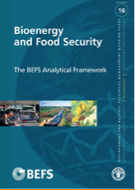The "Bioenergy and Food Security (BEFS) Analytical Framework” addresses multiple sectors and can be used to bring together diverse institutions and ministries to address step-by-step questions on feasibility of bioenergy development, as well as social, environmental and food security dimensions.
 17 May 2011: The Food and Agriculture Organization of the UN (FAO) has finalized its “Bioenergy and Food Security (BEFS) Analytical Framework,” which aims to assist policymakers in evaluating the potential of bioenergy and its possible food security impacts.
17 May 2011: The Food and Agriculture Organization of the UN (FAO) has finalized its “Bioenergy and Food Security (BEFS) Analytical Framework,” which aims to assist policymakers in evaluating the potential of bioenergy and its possible food security impacts.
The framework was tested in Peru, Tanzania and Thailand during the three-year development phase. It addresses multiple sectors and can be used to bring together diverse institutions and ministries to address step-by-step questions on feasibility of bioenergy development, as well as social, environmental and food security dimensions. The framework includes a diagnosis and a ten-year outlook based on how national agricultural markets are likely to evolve and the likely impacts of bioenergy developments on this evolution.
From a natural resources and production perspective, the framework assesses: what bioenergy crops can be grown and where; current yields and opportunities for increasing yields; demands on water and opportunities for increased water efficiency; and the availability of woody biomass from existing production.
On economic analysis, the framework explores whether biofuels can be produced profitably, the engagement of small-scale farmers and greenhouse gas (GHG) emissions benefits. Finally, from a socioeconomic perspective, the framework examines: implications for poverty, agricultural growth, employment and economic growth; impacts on prices for key foods; household welfare impacts and potentially vulnerable group; and interactions between prices, employment and wages related to biofuel development.
Associated with the framework, the FAO has performed a number of country-based case studies that highlight the opportunities for nurturing a bioenergy sector within developing countries, like Brazil, and opportunities to export bioenergy products to Europe. The case studies also address the concerns that investment in biofuels may also lead to a reduced food availability and higher food prices. The FAO will follow-up the framework with a project on Bioenergy and Food Security Criteria and Indicators, to develop a risk prevention and management tool, and an impact assessment and policy response tool. [FAO Press Release] [Publication: BEFS Analytical Framework] [Bioenergy and Food Security Project Website] [Bioenergy and Food Security Criteria and Indicators Project Website]